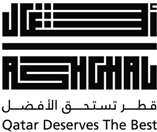 | |
| Company type | Government |
|---|---|
| Industry | Construction, infrastructure |
| Founded | 2004 |
| Headquarters | Al Faisal Tower, Al Dafna, Doha |
Key people | Dr. Eng. Saad Ahmed Al Mohannadi (President) |
Number of employees | 30000 (27000 construction workers) |
| Website | www |
Ashghal (Arabic: هيئة الأشغال العامة) is the Public Works Authority of Qatar headquartered in Al Dafna, Doha. Ashghal was established based on the Emiri Decree issued by the Father Emir Sheikh Hamad bin Khalifa Al Thani on 20 January 2004, as an autonomous body to design, deliver and manage all infrastructure-related projects as well as public amenities of the State. Ashghal is responsible for the construction and maintenance of local roads, drainage systems, highways and public buildings like mosques, schools, hospital, health centers, parks, etc.
Organizational structure
[edit]The current president of Ashghal is H.E. Dr. Eng. Saad Ahmed Al Mohannadi.[1]
Ashghal's business units consist of five major affairs:[2]
- Infrastructure Affairs
- Asset Affairs
- Buildings Affairs
- Technical Support Affairs
- Shared Services Affairs
Programmes
[edit]Ashghal currently has the following key programmes:[3]
Responsibilities
[edit]Ashghal was responsible for building infrastructure facilities for the 2022 FIFA World Cup hosted by Qatar.[6] The Arab country had planned to spend up to $100 billion[7] in infrastructure projects between 2013 and 2022. Various companies like CH2M Hill,[8] KBR,[9] and Parsons Brinckerhoff[10] are associated with many of Ashghal's projects.
Criticisms
[edit]Ashghal has been awarded many contracts and infrastructure projects contributing to preparations for the 2022 World Cup in Doha.[11] Qatar has received a substantial amount of criticism and controversy surrounding their World Cup bid, most of which surrounds the treatment labor workers hired for infrastructure projects. Reports from multiple sources estimated that roughly 4000 migrant workers would lose their lives in the building process, many of them unaccounted for, one estimate claiming at least one worker a day would die.[12] Sharan Burrow, of the International Trade Union Confederation claimed that the workers were "basically slaves", claiming that "the Qatari government [has] no commitment to human rights".[13]
On 30 August 2020, General Secretary of ITUC Sharan Burrow, accepted the changes and said that Qatar has regularized its industrial relations system and dismantled the systematic power imbalance between workers and employers. These changes are a break with the past and offer a future for migrant workers in Qatar underpinned by laws which respect workers, along with grievance and remedy systems.[14] According to the reports more than 400,000 people have directly benefited from the new minimum wage, improvements to the wage protection system now protect 96% of eligible workers from wage abuse, and hundreds of thousands of workers have left Qatar and returned without permission from their employer since exit permits were introduced. These statistics illustrate the impact of Qatar's reforms in the report drafted by the guardian on 22 November 2021. The Worker’s Support and Insurance Fund, established in 2019, has disbursed QAR 358,000,000 (nearly USD 100m) to over 35,000 workers, as of March 2022 revealed by ILO. The online complaints platform has increased workers’ access to the Ministry of Labour. The number of complaints was nearly 25,000 in 2021, compared to 11,000 in the previous year. For the first time in the Gulf region, migrant workers are being elected as representatives in the workplace. As of March 2022, 228 workers’ representatives were elected to represent almost 40,000 employees in 37 enterprises. Platforms have been established to elevate the priorities and discussions that emerge from individual joint committees to the main contractor level, at the sectoral level and at the national level was carried out in the same ILO report. New legislation was adopted to protect workers from heat stress during the summer months, with the expansion of summertime working hours during which outdoor work is prohibited. There is also a threshold for stopping outdoor work, regardless of the time of day or year. To supplement the protections in the Domestic Workers Law, a new standard employment contract for domestic workers has been adopted. Awareness raising materials on domestic workers’ rights under the Law have been disseminated, and networks of domestic workers have been established.[15][16]
References
[edit]- ^ "HH the Emir Appoints President and Assistant President of Public Works Authority". Qatar News Agency. 4 January 2016. Archived from the original on 30 March 2017. Retrieved 29 March 2017.
- ^ Public Works Authority Official Website - About Ashghal
- ^ Gulf Times newspaper - Ashghal Projects
- ^ Gulf Times newspaper - Expressway contracts awarded
- ^ "The peninsula newspaper - Road projects deals signed". Archived from the original on 16 April 2014. Retrieved 15 April 2014.
- ^ Qatar wins right to host 2022 World Cup, BBC 2 Dec 2010
- ^ "Peninsula News 5 December 2010". Archived from the original on 8 December 2010. Retrieved 4 July 2013.
- ^ Amey Info January 28, 2013 Archived 4 March 2013 at the Wayback Machine
- ^ "Peninsula 9 February 2011". Archived from the original on 13 February 2011. Retrieved 4 July 2013.
- ^ Arabian Industry 22 June 2013
- ^ "Qatar cuts spending on new health facilities - official". Reuters. 25 May 2016. Retrieved 23 September 2016.
- ^ Booth, Robert (26 September 2013). "Qatar World Cup construction 'will leave 4,000 migrant workers dead'". The Guardian. ISSN 0261-3077. Retrieved 23 September 2016.
- ^ Montague, James (1 May 2013). "World Cup hosts Qatar face scrutiny over 'slavery' accusations - CNN.com". CNN. Retrieved 23 September 2016.
- ^ "A new dawn for migrant workers in Qatar". www.ituc-csi.org. Retrieved 9 August 2022.
- ^ "Overview of Qatar's labour reforms". www.ilo.org. 7 April 2022. Retrieved 9 August 2022.
- ^ Letters (22 November 2021). "Improving migrant workers' lives in Qatar | Letter". the Guardian. Retrieved 9 August 2022.